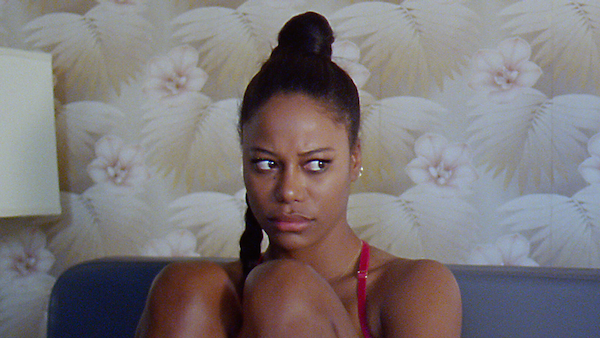Movie review by Greg Carlson
Janicza Bravo’s “Zola” — titled onscreen as “@Zola” or “@zola” depending on your favorite style guide — is the curious story by Aziah “Zola” Wells candidly recounting a partly truthful and partly embellished autobiographical sex trafficking road trip odyssey she unloaded as a series of 148 tweets in the fall of 2015. The thread, which Wells took down twice before getting the desired traction, became a Twitterverse cause célèbre. Movie adaptation plans quickly followed. By early 2016, James Franco was identified as the director before sexual misconduct allegations torpedoed that potential iteration of the project.
Franco’s exit and Bravo’s entrance turned out to be the greatest gift Wells could have imagined, as “Zola” took shape as an audacious and original feat of personal storytelling and directorial bravado almost unimaginable from any studio. Crafting a script with Jeremy O. Harris, Bravo draws in part from David Kushner’s “Rolling Stone” summary titled “Zola Tells All: The Real Story Behind the Greatest Stripper Saga Ever Tweeted.” The result is a whiplash catalog of increasingly wild situations and dizzy but calculated shifts in tone. Comedy, tragedy, horror, and parody take turns at the wheel.
Despite its outward appearances and its stylistic kinship to the Florida trash culture milieu of Harmony Korine’s “Spring Breakers” and “The Beach Bum,” “Zola” communicates a series of sophisticated ideas through its use of voiceover narration, nonverbal reactions, and spoken dialogue of restaurant server and part-time exotic dancer Zola (Taylour Paige, fantastic). With one notable exception, the narrative is filtered through the watchful, skeptical consciousness of a unique voice we are invited to respect and trust.
After a friendly if sketchy customer named Stefani (Riley Keough) invites Zola to join her on the Detroit to Tampa adventure that allows Bravo to play with the tropes of first the road trip and then the mala noche, Zola navigates a treacherous series of in-over-her-head episodes when the group’s two male travel companions are exposed for their truer selves: “roommate” X (Colman Domingo) is Stefani’s malevolent pimp and boyfriend Derrek (Nicholas Braun) is an incompetent danger-magnet apparently incapable of making a sound decision.
With Bravo’s guidance, Keough navigates the minefield of grotesque stereotype and cultural appropriation suggested by the African American Vernacular English spoken by “white bitch” Stefani. But “Zola” is a star-making opportunity that Paige owns with every raised eyebrow and skeptical look. Zola is confident and self-assured, but Paige also expresses her fear, nervousness, and vulnerability. The heavy-duty misogyny of coercion, abuse, and assault is amplified by Bravo’s unsettling comic gloss. And the presence of casual, everyday racism, as glimpsed through vehicle windows and hovering at the edge of the frame, creeps close in a grim display of thematic anamorphosis.
At one point, composer Mica Levi’s harp glissandos nod directly to Bernard Herrmann’s “Taxi Driver” score, and the homage is just one of many surprises that propel the film to multiple-view territory. Bravo’s many tasty touches, including the protean speaking voice of X, a slideshow montage of the genitalia of Stefani’s clientele, a heaven-sent strip club prayer circle, the bouncing basketball beat outside the hotel room, and the conspiratorial social media dispatches (“Y’all wanna hear a story about…”) accompanied by those familiar chirps and whooshes, identify the filmmaker as a genuine talent.
